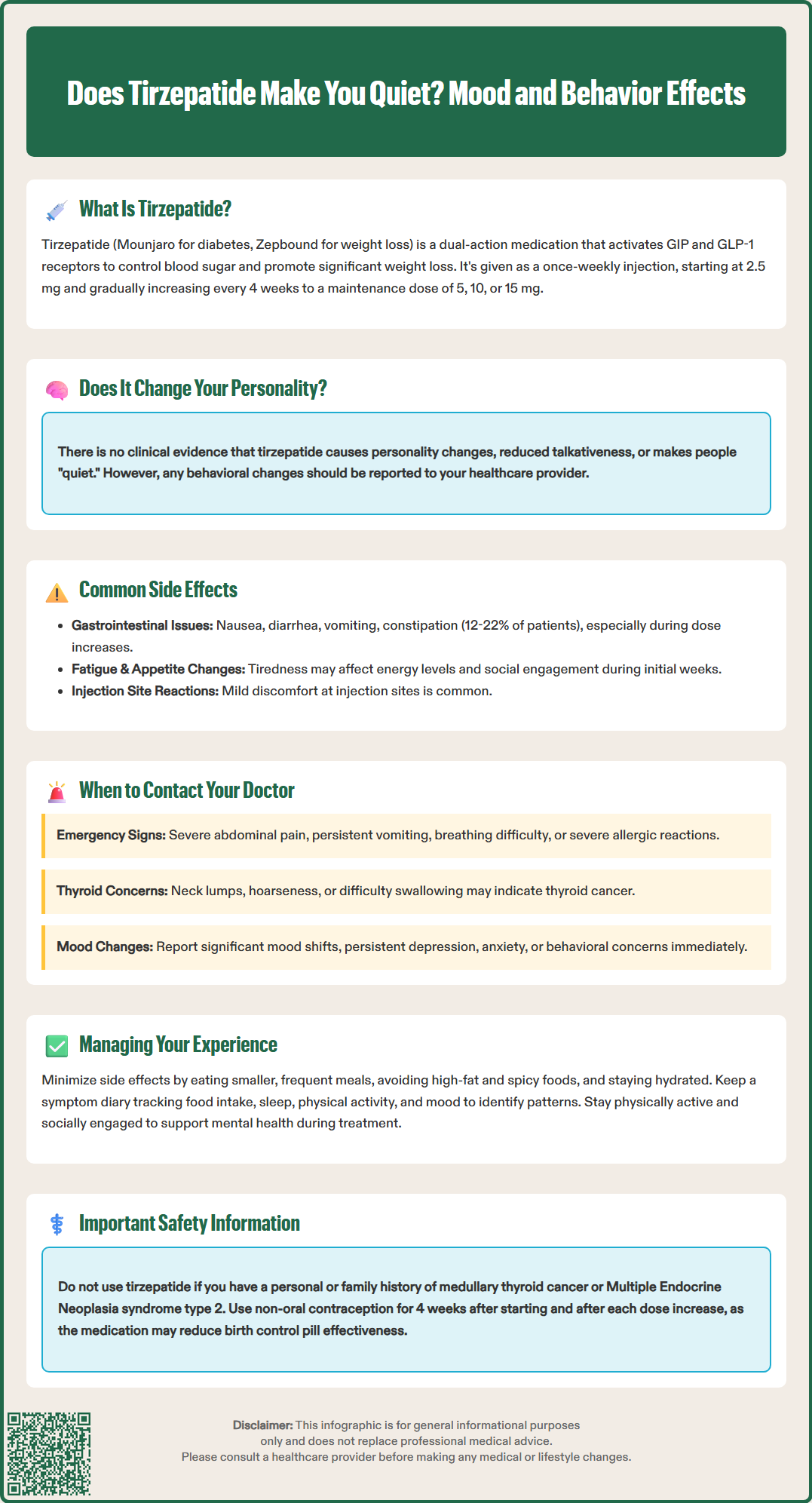LOSE WEIGHT WITH MEDICAL SUPPORT — BUILT FOR MEN
- Your personalised programme is built around medical care, not willpower.
- No generic diets. No guesswork.
- Just science-backed results and expert support.
Find out if you’re eligible

Many patients starting tirzepatide wonder about potential behavioral changes, including whether the medication might make them feel quieter or less socially engaged. Tirzepatide (Mounjaro, Zepbound) is a dual GIP/GLP-1 receptor agonist approved for type 2 diabetes and weight management. While there is no established clinical evidence that tirzepatide directly causes personality changes or reduced talkativeness, some patients report fatigue, decreased appetite, and gastrointestinal symptoms that may indirectly affect energy levels and social engagement. Understanding how tirzepatide works and its potential side effects can help you recognize what to expect during treatment and when to contact your healthcare provider about any concerning changes.
Quick Answer: There is no established clinical evidence that tirzepatide directly causes patients to become quieter or experience personality changes.
Tirzepatide is a prescription medication approved by the FDA for the treatment of type 2 diabetes mellitus and chronic weight management in adults. Marketed under the brand names Mounjaro (for diabetes) and Zepbound (for weight management), tirzepatide represents a novel class of medications known as dual glucose-dependent insulinotropic polypeptide (GIP) and glucagon-like peptide-1 (GLP-1) receptor agonists.
The medication works through a unique dual mechanism of action. By activating both GIP and GLP-1 receptors, tirzepatide enhances insulin secretion in response to elevated blood glucose levels, suppresses inappropriate glucagon release, slows gastric emptying, and reduces appetite through effects on brain centers that regulate food intake. This combined action results in improved glycemic control and significant weight loss in clinical trials.
Tirzepatide is administered as a once-weekly subcutaneous injection, with dosing typically starting at 2.5 mg for 4 weeks, then increasing by 2.5 mg every 4 weeks as tolerated to a maintenance dose of 5, 10, or 15 mg based on individual response. Tirzepatide is not indicated for type 1 diabetes or diabetic ketoacidosis and should not be used in patients with a personal or family history of medullary thyroid carcinoma (MTC) or Multiple Endocrine Neoplasia syndrome type 2 (MEN2).
Importantly, tirzepatide may reduce the effectiveness of oral contraceptives, particularly during dose initiation or increases. Patients should use a non-oral form of contraception for 4 weeks after starting tirzepatide and after each dose increase.
Regarding the specific question of whether tirzepatide makes you "quiet" or affects mood and behavior, there is no established clinical evidence linking tirzepatide directly to personality changes, reduced talkativeness, or social withdrawal. The FDA has evaluated reports of suicidal thoughts with GLP-1 receptor agonists and has not found clear evidence of a causal relationship, though monitoring continues. Any behavioral changes experienced while taking tirzepatide warrant discussion with your healthcare provider.
The most frequently reported side effects of tirzepatide are gastrointestinal in nature, occurring in a substantial proportion of patients, particularly during dose escalation. These include nausea, diarrhea, vomiting, constipation, abdominal pain, and decreased appetite. In clinical trials for type 2 diabetes, nausea affected approximately 12-22% of patients depending on the dose, while diarrhea occurred in 13-16% of participants. Rates were generally higher in weight management trials. These gastrointestinal symptoms are generally mild to moderate in severity and tend to diminish over time as the body adjusts to the medication.
Other common adverse effects include injection site reactions, fatigue, and dyspepsia (indigestion). Some patients report feeling unusually tired or experiencing reduced energy levels, particularly in the initial weeks of treatment. This fatigue, combined with decreased appetite and potential gastrointestinal discomfort, may indirectly affect a person's social engagement, energy for conversation, or overall mood—potentially contributing to a perception of being "quieter" than usual.
More serious but less common side effects include hypoglycemia (particularly when used with insulin or sulfonylureas), acute pancreatitis, gallbladder disease, and acute kidney injury (often related to dehydration from gastrointestinal symptoms). The FDA label includes a boxed warning about thyroid C-cell tumors observed in animal studies, though the relevance to humans remains uncertain. Allergic reactions, including serious hypersensitivity, have been reported rarely.
Patients with diabetic retinopathy should be monitored closely, as rapid improvement in blood glucose can temporarily worsen retinopathy. Tirzepatide is not recommended for patients with severe gastrointestinal disease, including severe gastroparesis.
It is important to note that while mood changes, depression, or anxiety are not listed as common adverse effects in the prescribing information, individual experiences can vary. Weight loss itself, changes in eating patterns, and the physical adjustment to medication can sometimes affect emotional well-being and social behavior. Any concerning changes in mood, behavior, or personality should be discussed with your healthcare provider.

Patients taking tirzepatide should maintain open communication with their healthcare team and know when to seek medical advice. Immediate medical attention is warranted if you experience severe abdominal pain that does not resolve, which could indicate pancreatitis—a serious inflammation of the pancreas. Similarly, persistent nausea and vomiting that prevents adequate fluid intake, signs of dehydration (decreased urination, dizziness, dry mouth), or symptoms of gallbladder problems (upper abdominal pain, fever, yellowing of skin or eyes) require prompt evaluation.
Signs of allergic reactions, including difficulty breathing, severe rash, swelling of the face or throat, or rapid heartbeat, constitute medical emergencies requiring immediate care. Additionally, symptoms of hypoglycemia—such as shakiness, confusion, sweating, rapid heartbeat, or loss of consciousness—particularly in patients taking other diabetes medications, should be addressed urgently.
Contact your healthcare provider immediately if you notice symptoms that could indicate medullary thyroid carcinoma, including a lump in the neck, hoarseness, difficulty swallowing, or shortness of breath. These symptoms require prompt medical evaluation.
If you are taking Zepbound for weight management and become pregnant, inform your healthcare provider immediately as the medication is not recommended during pregnancy. Discuss with your provider if you are planning pregnancy.
Beyond acute concerns, you should contact your healthcare provider if you experience significant changes in mood, persistent feelings of depression or anxiety, social withdrawal, or behavioral changes that concern you or your family members. While the FDA has not found clear evidence linking GLP-1 receptor agonists to suicidal thoughts, any concerning mood changes should be evaluated.
Other reasons to reach out include persistent gastrointestinal symptoms that interfere with daily activities or nutrition, unexplained fatigue lasting beyond the initial adjustment period, changes in vision (especially if you have diabetic retinopathy), or any new symptoms that worry you. Regular follow-up appointments are essential for monitoring kidney function, blood glucose levels, and overall response to therapy.
Successfully managing your experience with tirzepatide involves both practical strategies for minimizing side effects and maintaining overall well-being during treatment. To reduce gastrointestinal symptoms, eat smaller, more frequent meals rather than large portions, avoid high-fat and spicy foods that may worsen nausea, and stay well-hydrated throughout the day. Taking time to eat slowly and stopping when you feel comfortably satisfied—rather than full—can help prevent discomfort.
Following the recommended titration schedule (increasing by 2.5 mg every 4 weeks) is important for minimizing side effects. If gastrointestinal symptoms are severe, your healthcare provider might suggest a slower titration pace. Remember that if you're using oral contraceptives, you should use a backup non-oral contraceptive method for 4 weeks after starting tirzepatide and after each dose increase.
If you notice changes in your energy levels, mood, or social engagement while taking tirzepatide, consider keeping a symptom diary to track patterns and potential triggers. Document your food intake, sleep quality, physical activity, and emotional state. This information can be valuable when discussing your experience with your healthcare provider. Ensure you're meeting your nutritional needs despite reduced appetite—consider consulting a registered dietitian who can help you maintain adequate protein, vitamin, and mineral intake during weight loss.
Maintaining social connections and regular activities is important for mental health during any medical treatment. If you feel less inclined to socialize or notice yourself becoming withdrawn, make conscious efforts to stay engaged with friends and family, even if in smaller doses. Physical activity, when appropriate for your health status, can improve both mood and energy levels. Even gentle activities like walking can be beneficial.
Work closely with your healthcare team to optimize your treatment plan. Dose adjustments may help if side effects are problematic, and your provider can assess whether additional support—such as anti-nausea medication or mental health counseling—might be beneficial. If mood symptoms are significant or persistent, don't hesitate to ask for a referral to a behavioral health specialist. Remember that the initial adjustment period is often the most challenging, and many side effects improve with time. Never discontinue or adjust your medication without medical guidance, as abrupt changes can affect your diabetes control or weight management goals.
Mood changes are not listed as common side effects in tirzepatide prescribing information, and the FDA has not found clear evidence linking GLP-1 receptor agonists to depression or suicidal thoughts. However, any concerning mood changes should be discussed with your healthcare provider for proper evaluation.
Common side effects like fatigue, decreased appetite, nausea, and gastrointestinal discomfort may indirectly reduce your energy for social activities and conversation. These symptoms typically improve over time as your body adjusts to the medication.
Contact your healthcare provider if you experience significant changes in mood, persistent depression or anxiety, social withdrawal, or any behavioral changes that concern you or your family members. These symptoms warrant medical evaluation even though they are not established side effects of tirzepatide.
All medical content on this blog is created using reputable, evidence-based sources and is regularly reviewed for accuracy and relevance. While we strive to keep our content current with the latest research and clinical guidelines, it is intended for general informational purposes only.
This content is not a substitute for professional medical advice, diagnosis, or treatment. Always consult a licensed healthcare provider with any medical questions or concerns. Use of this information is at your own risk, and we are not liable for any outcomes resulting from its use.